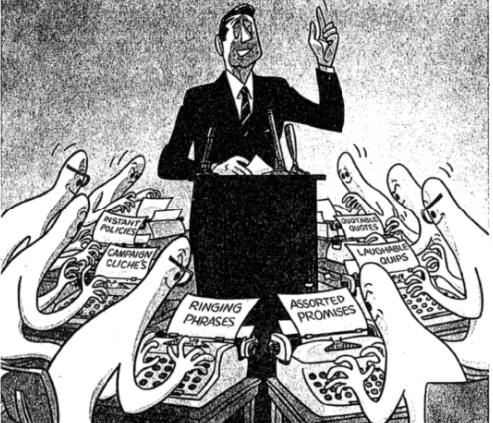Domestic Abuse: Words Are Not for Throwing
September 01, 2021
Even Frank Luntz has changed the way he communicates because, he says, "We are in so much trouble." How about you?
“We don’t hit, we don’t bite, and we don’t throw things.” Those are the first rules any parent teaches any child.
And then the parents put the kids to bed, go online and start hitting each other, biting each other and throwing things—words, mainly—for the very same reasons their kids do: to get attention, and because they don’t know what else to do.
During a quiet week before he had the Kabul disaster to sink his fangs into, a conservative University of Chicago political science professor emeritus I know named Charles Lipson posted this, on Facebook: “I was just out back weeding despite the dreadful heat and humidity. I almost started singing ‘Ol’ Man River.’ (Turns out that’s yet another socio-cultural issue. Isn’t everything?)”
I replied, “In the category of Gratuitous Attempts to Irritate Cultural Sores, this post might be the 2021 winner. What’s the matter with you, Charles Lipson?”
The thing is, Lipson has a large following that seems to regard him as a pretty even-handed arbiter of current events in America. And he loves his country (and political science) so much that he’s posting this sort of shit? When he and his wife are out to dinner with another couple who are having marriage difficulties, does Charles remind the man about that one time his wife called him fat?
I wrote a book that claimed I learned everything I knew about communication because of all the corporate communication executives with whom I’ve surrounded myself. I’ve had to revise that since publishing the book: I’ve learned not from most of the professional communicators I’ve known—just from the wisest. Because many of them aren’t any wiser about communication than your average jackhammer operator. In fact, a lot of them communicate like jackhammer operators. In the white-collar world, that’s called propaganda.
One of the most articulate communicators I know has been in this business for more than two decades. You’d think he’d understand that words are not things to be thrown around in rage, like bricks into a television set. Yet, I read regular rants from this guy, using his considerable rhetorical gifts to rail over and over and over again at how goddamn dumb everyone who isn’t vaccinated is.
But my pal the big strategic communication executive admits he isn’t writing his rants to communicate. “Like with my political posts over the past few years, the goal isn’t to convince anyone,” he told me. “I know that’s a fool’s errand. You cannot reason someone out of a position they did not reason themselves into. I post mostly to stop the screaming in my head for a few minutes.”
I replied: “Do you not think you are doing any damage at all, painting others who see these posts further into a corner? Seems like there must be better, more constructive ways for a smart dude like you to stop the head-screaming than to spray paint this shit on Facebook. I think you should look for ways.”
He said: “I am fairly confident that I’ve driven away nearly all of the science-deniers amongst my online tribe. There may be one or two left, but I won’t name and shame them. And I am not arrogant enough to believe that a post here has much reach at all in the grand scheme.”
I replied: “So you’re just wasting everybody’s time? I’m genuinely curious how a strategic communication person can waste words like this—smart, well-crafted words—and expect others to read them, for no good reason either.”
I added: “In this environment, believe that EACH OF US must be more civically responsible than to publicly, pointlessly holler at the top of their lungs, knowing that the only possible result will be to drive people further into their corners, down into their bunkers. Public ranting is the adult equivalent of childhood tantrums, and we each need to GROW UP.”
If you disagree with me on this, ask conservative rhetoric mastermind Frank Luntz, who in the wake of the last presidential election and January 6, doesn’t call himself a Republican pollster anymore, and vows to devote himself to telling the truth because he’s scared shitless, and sad to the point of tears. See below, around 51:15, when Luntz breaks down as he says, “We are in so much trouble. I don’t know if we’ll ever come back again. … You know, I’ve never felt the same way about life when I found out that there was no Santa Claus. It’s the same way that I feel about my country. I’m sorry.”
Longtime Luntz-watchers might gag while they point out that Luntz’s life’s work helped bring us to this place. I’d like to hear him respond to that, too.
But at least he can see that we’re in a different place now, and we do have to behave differently if we want the whole shithouse not to go up in flames.
Does Charles Lipson not see that, or is he just unable to figure out any other way to keep his following, than to keep fondling wounds so they won’t heal?
Does my communicator friend not see that, or can he find no more constructive outlet for his rage than to pour more bitter rhetorical pollution into the air?
As my old friend Mike Long says, “Nobody ever won an argument by starting out, ‘Hey Stupid.’”
One of my favorite writers, Jason Pargin, argues the same, more elaborately and unanswerably.
And in that book of mine, there’s a quote from one of those truly wise communicators who have taught me so much, the late communication coach Jeff Ansell. “When a word goes into the universe, it doesn’t go away,” he said. “It reverberates around the universe forever.”
And as I say in the book myself, I can’t prove words stay in the universe forever. But I can’t figure out how they would get out.
So let’s use them, if not more sparingly, at least more gently.




